Road racing: What does the future hold post-pandemic?
- Published
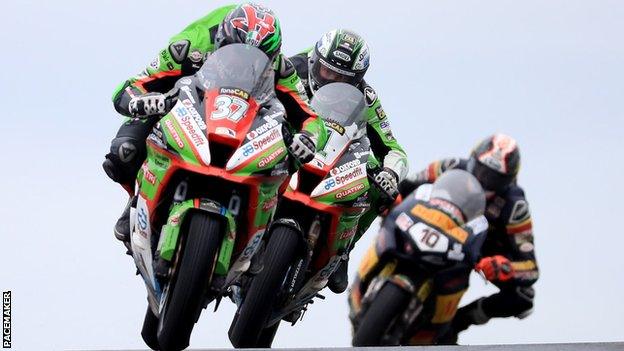
James Hillier, Glenn Irwin and Conor Cummins in action in the 2019 North West 200 Superbike race
A little over 12 months ago, the prospect of one road racing season being all but wiped out seemed unthinkable for two-wheel motorsport fanatics.
One year on and the ongoing restrictions aimed at curtailing the spread of Covid-19 have again mostly put pay to the sport across the island of Ireland and in the Isle of Man.
All is not lost, however, as the Armoy road races have been given approval to go ahead in late July and the Cookstown 100 has been pencilled in for mid-September.
In addition, four race meetings have been arranged to take place over the Scarborough parkland course on England's Yorkshire coast.
Northern Ireland bike fans can also look forward to following the exploits of Jonathan Rea as he attempts to secure a seventh World Superbike title on his new version of the Kawasaki and brothers Glenn and Andrew Irwin, plus a strong supporting cast, battle it out for top honours on British short circuits.
Meanwhile the Irish short circuit series is scheduled to rev into action on 5 June, although confirmation is still awaited as to whether the Belfast and District Club's meeting will go ahead on that date.
As far as road racing goes, the sport was already facing major challenges such as rising insurance costs pre-pandemic, with races including the international Ulster Grand Prix falling off the calendar.
BBC Sport NI spoke to members of the organising team from the North West 200, the Tandragee 100 and Cookstown 100 national road races, plus team owner and Irish road racing great Ryan Farquhar to find out their opinions on the future of the sport.
'Optimistic there is light at the end of the tunnel'
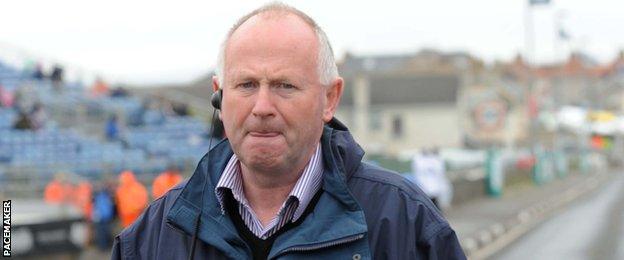
Mervyn Whyte has assumed a new role as the North West 200's Event Consultant
Mervyn Whyte (Event Consultant, North West 200): "With the North West being cancelled for a second year in a row financially it has been a difficult year with no income and no cash flow.
"The constitution of the event emphasises it is a 'not for profit' race but we have a lot of fixed costs to be paid on a monthly basis and we have struggled to a certain extent.
"We received almost £47,000 from the Sports Sustainability Fund and that is a big help but we need financial support from Tourist Board Northern Ireland and Causeway Coast and Glens Council to get through to 2022. That financial backing is crucial.
"We are still reviewing our plans for 2022 but we have continually kept in touch with our sponsors and I would be fairly optimistic about the future, reasonably positive that there is light at the end of the tunnel and things can return in a healthy state.
"Fans will have been starved of racing for a couple of years so I'm hopeful that you will see increased crowds come out and support road race events.
'Hopefully people will be chomping to go to races'
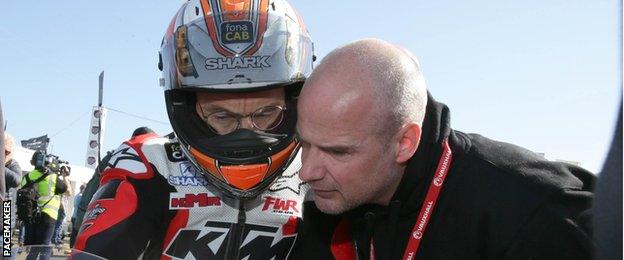
Ryan Farquhar (right) with KMR Kawasaki rider Jeremy McWilliams on the grid at the North West 200
Ryan Farquhar (Champion rider/Team owner, KMR Racing): "It's hard to know what the situation will be with sponsorship for riders, teams and events from a long term point of view. Everything is up in the air."
"I won't be in a position to do Armoy and Cookstown as it's not viable to get sponsorship for two road races with the amount of effort and money that is required.
"Unless financial backing comes up out of the blue it won't be happening. Other team owners have a strong business behind them to fund their racing as a hobby but I am not in that situation.
"The last few years I have concentrated my efforts on the North West and the TT, I always try to finalise a deal to do the TT and then everything else falls in round that. This year I may just opt to do a few rounds of the British Thundersport championship on the short circuits.
"On the positive side, with nothing having happened for two years, hopefully people will be chomping to go to races, buy a programme and pay their way to support the meetings.
"From a negative perspective, it's hard to pin down the longer term economic impact of the pandemic.
"If the organisers of the major races are still paying start money and there is sufficient sponsorship I intend still having bikes on the grid but if not then I won't be there. I couldn't afford it."
'We need every penny and everyone doing their bit'
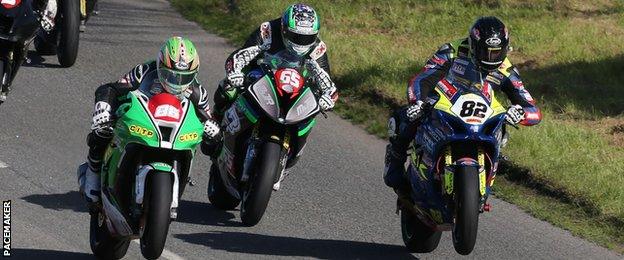
Derek McGee, Michael Sweeney and Derek Sheils compete in the feature race at the 2019 Tandragee 100
Anne Forsythe (Clerk of the course, Tandragee 100): "It's a challenging time. This year we decided pull the pin early before we spent too much money but we aim to put our best foot forward for our delayed 60th event next year.
"We spent a lot of money preparing for last year's event before lockdown came into effect so we are grateful for the £30,000 or so we received from the Sport Sustainability Fund - it is a good injection that will help us make up the shortfall.
"A lot of our sponsors have been with us for a long time - they are extremely loyal and have pledged their support for the future so that stands us in good stead.
"We need our club members and fans to support us too as we need every penny and everyone doing their bit, including our faithful volunteers.
"In terms of 2022 nobody knows what restrictions will still be in place for mass gatherings so that will influence our strategy going forward as regards possible advance online payments and programme sales."
'Not depending on good weather to attract a crowd'
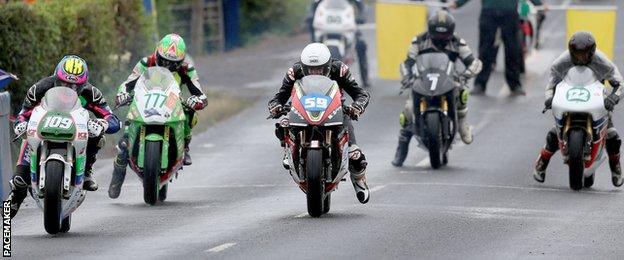
Action from the Cookstown 100 - the only Irish road race to take place in 2020
Kenny Loughrin (Treasurer/PRO, Cookstown Club, organisers of Cookstown 100): "In general, motorcycle road racing has not been going in the right direction with races not taking place and clubs in financial difficulties.
"Financially, we are in the fortunate position of having most of our sponsorship for our race in September tied up and a few new sponsors on board.
"We adopted an online pre-booking system last year and came out of it ok. That is definitely the way forward for us.
"Even though the spectator numbers were restricted to less than 2000 we had the money in the bank before the race took place and so we were not depending on good weather to attract a crowd.
"The Stormont authorities were happy with the measures we put in place last year and we received some money from the Hardship Fund so hopefully we will be able to up our numbers this year."